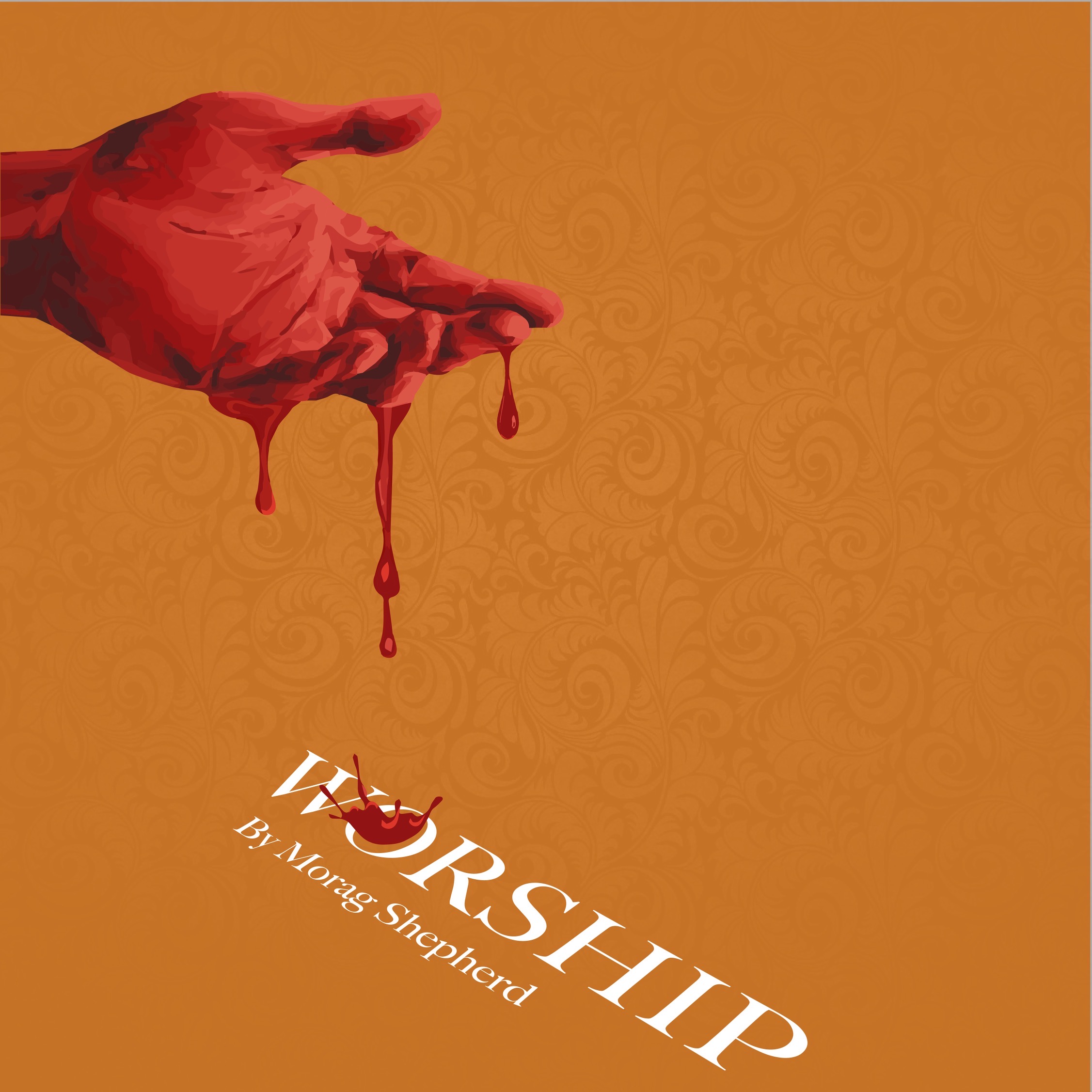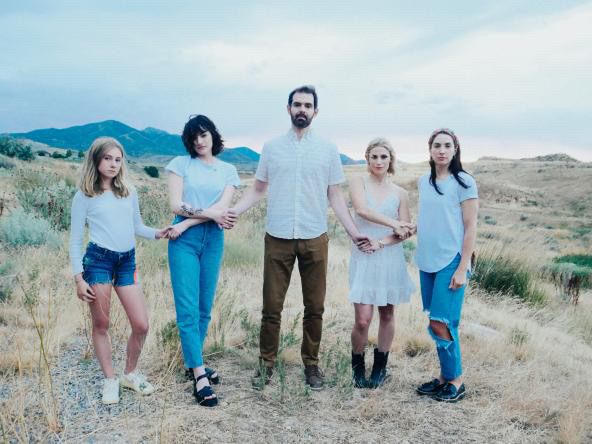SALT LAKE CITY — Just getting to the space inside the SLC ArtsHub for the world premiere of Morag Shepherd’s Worship is an adventure. If it weren’t for the helpful staff opening gates, providing key codes, and directing patrons down long corridors, I might not have found the space, tucked deep inside the hub. However, this journey feels almost part of the production, setting the audience up for the complex journey they are about to undertake inside.

The performance space feels a bit like walking into someone’s basement. There is a mattress on a squat frame dominating the center of the room below a low ceiling. A single row of red chairs frames the perimeter of the room on all four sides, bordered by white curtains. There is a man sitting on the edge of the mattress with his back to the door from which the audience enters. It feels like being a voyeur in this man’s personal space.
As the audience settles in, and without any formal preamble, Chloe, a young girl (played by Ainslie Jane Shepherd) enters the space with her violin and begins to circle the man and the bed while plucking the strings. Shortly, the three other female characters also enter, each taking a place on the mattress, while the man continues to sit. It is clear by their gazes that each character is inhabiting the room separately, rather than together. Thus, before a single line of dialogue is spoken, a convention is established conveying that this space and the bed will represent multiple locations throughout the production.
The play is based on the true story of Michael James Clay, a former BYU professor charged with sexual battery of three female students. (Clay later pleaded no contest). Shepherd explains that the play is “less about abusers and victims, and more about how people make choices in the systems they give their power to.” Indeed, as the play unfolds, the character at the center of the production, Mason (played by Nick Mathews), and the patriarchal religion he represents are given varying amounts of power by the four female characters in the play.

Knowing the true story behind the play makes me want to despise the character of Mason from the outset. Yet Shepherd’s skillful writing of the interactions between Mason and his daughter Chloe, and other vulnerable scene work does not let me off quite that easily. Mason’s behavior is no doubt reprehensible, and yet the production gives him some redeeming qualities, which adds depth to his character. It does not excuse his behavior, nor does it make him necessarily likeable, but this is a real person who can be relatable and sympathetic. This delicate balance reminds me that every human being is a combination of their best and worst qualities. Mathews’s portrayal of Mason is executed well, walking a delicate balance between the contemptible and the human.
Indeed, all five actors give strong performances. But Renny Grames’s performance as Flora is stellar. Flora, a prostitute with whom Mason believes he has developed more than a contractual relationship, is the one character who chooses not to give him her power. In return, she is the one woman with whom he is the most honest. This raises the question of whether women command more sincerity and honesty from their partners when they refuse to relinquish power to them.
The technical elements are simple and stark including the lighting, the set (designed by Gail Wright), the sound and costuming. Interestingly, all characters wear white. (There is no costume designer listed in the program, and so I will assume that choice is the director’s or is scripted by the playwright.) There are many ways this choice could be interpreted, but given the aspects of the LDS faith embedded into the production, this choice echoes that religion’s practice of wearing all-white clothing inside their temples. In the LDS context, the white clothing is said to symbolize that all people are equal before God. Similarly, the audience is invited into this space to participate in a shared theatrical experience, and the white clothing suggests that all the characters have a shared humanity and equality, regardless of their choices. The script uses the phrase, “This is a safe space,” repeatedly throughout, even in moments when the characters make choices in those spaces that are clearly not safe. Nonetheless, this reminds me that the theatre can and should be a safe place for audiences and artists to share in a communal and often sacred experience.

Shepherd’s writing is tight. She has a well-honed gift for natural, yet pointed dialogue. In this relatively short production, she teases out nuance and probes the depths of relationships. Every word is meaningful. Director Stephanie Stroud’s approach follows the same methodology. Everything is intentional, and nothing is left to chance. In an era of excessive communication, of too many words saying too little of substance, the succinctness of Worship is refreshing.
Brevity can also have a downside however, and the play’s ending seems abrupt and unsatisfying. Perhaps this is intentional on the part of the playwright, but it feels like an unfinished musical phrase. I was expecting some final note to resolve the dissonance the play produced. That note need not be an expected one, or a note to tie up all the loose ends, but could instead be a note that nonetheless resolves the dissonance. Otherwise there is no change. Perhaps Shepherd wants her audience to leave unsatisfied, in a state of disharmony, and wondering whether anything will change for the characters—especially Mason. In the final scene he suggests to his wife Emma (played by Ariana Farber) that something is going to change, something bad is going to happen, and soon. But the play does not give any indication that anything will happen or that Mason will either choose or be forced to change. And without something more explicit, I am left to wonder if this is all just part of his normal cycle and whether he is going to continue repeating the same destructive and abusive behavior again and again.
But perhaps that is the very point. Perhaps Shepherd is trying to show that the same destructive and abusive behavior in society — and in particular within patriarchal religious traditions — will continue to repeat ad nauseum unless and until women cease to feed it their power. Maybe this behavior will continue until society and even the religions themselves demand it to stop.
Worship is a compelling production about power, relationships, and dissonance. It is also disturbing in its subject matter, and as such, is recommended for mature audiences. The show runs a scant 70 minutes without an intermission—about as long as a standard worship service. And like a good worship service, packs in a lot to think about during that brief time.
[box]The Immigrant’s Daughter Theatre world premiere of Worship plays Fridays and Saturdays at 7:30 PM through October 21 at the Utah Arts Alliance’s SLC Arts Hub (663 West 100 South, Salt Lake City). Tickets are $30. For tickets, please visit https://www.eventbrite.com/e/worship-tickets-712067301467.[/box]

